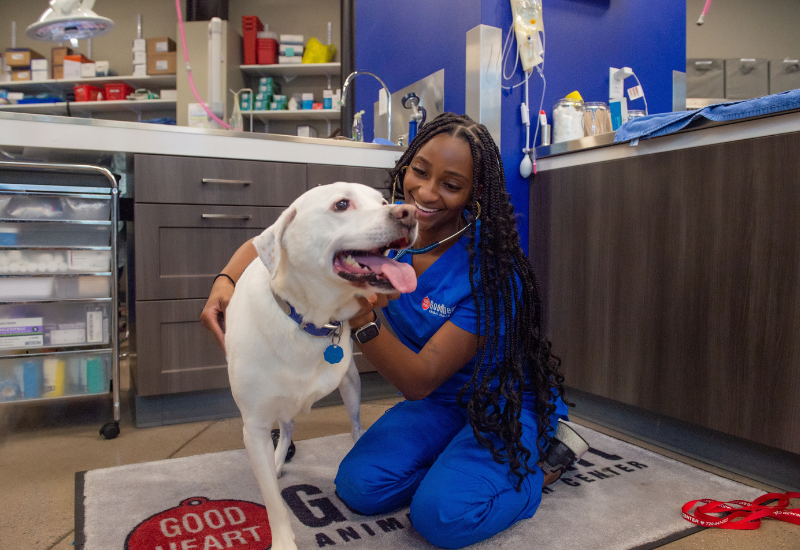Training Strategies Every Pet Owner Need To Know for Their Pets
Recognizing Your Animals' Nutritional Needs for Ideal Wellbeing

Relevance of Well Balanced Diets
Ensuring a balanced diet plan for family pets is critical for their overall wellness and health. An appropriate diet regimen not only sustains life however likewise boosts the top quality of life by supplying important nutrients that support various physical functions. Pets, like human beings, require a blend of proteins, carbs, minerals, fats, and vitamins to maintain ideal wellness. Each nutrient plays an unique function; proteins are vital for tissue repair service and growth, fats supply energy and assistance cell function, while carbs act as a key energy source.
Including a range of nutrients makes sure that family pets preserve a durable immune system, healthy skin, and a glossy layer. A well balanced diet can protect against a host of health and wellness concerns such as excessive weight, which is connected to diabetes and joint problems, or poor nutrition, which can lead to developing delays and body organ dysfunction.
Family pet owners should bear in mind section dimensions and calorie consumption, as overfeeding or underfeeding can have major repercussions. Consulting with veterinarians or animal nutritional experts can aid tailor diet plans to satisfy details requirements, ensuring that family pets obtain the appropriate equilibrium of nutrients needed for their dimension, activity, and age level. A well balanced and constant diet is essential for a pet dog's durability and joy.
Species-Specific Nutritional Requirements
How do different species of animals have differing nutritional demands? Each species has unique metabolic paths, digestive systems, and nutritional requirements that have to be satisfied for optimal health.
Birds, depending on their species, may call for a diet regimen rich in bugs, seeds, or fruits, emphasizing the variety within the bird world. Pets. Reptiles, such as serpents and turtles, in a similar way need species-specific diet plans, with some requiring high levels of calcium and others, a well-calibrated equilibrium of pests and plant matter
Comprehending the nutritional differences among various types is critical for pet dog owners. By providing and recognizing to these distinctions, we guarantee the arrangement of appropriate nourishment, sustaining the overall wellbeing and vigor of our pet dogs.
Age and Dimension Factors To Consider
While species-specific dietary requirements lay the foundation for a pet's size, age and diet additional fine-tune these demands. Young animals, such as puppies and kittycats, require diets rich in calories, healthy proteins, and essential nutrients to support fast development and development. These young animals have greater metabolic prices and call for more constant feedings to sustain their power degrees and guarantee appropriate development of muscular tissues, organs, and bones.
Formulas developed for adult animals typically concentrate on preserving weight, advertising gastrointestinal health, and supporting an active way of life. On the discover here other hand, elderly pet dogs might profit from specialized diets that attend to age-related difficulties, such as joint health and wellness, cognitive feature, and organ support.

Health Issues and Dietary Adjustments
Specific health problems can significantly influence the nutritional demands of pets, demanding tailored nutritional modifications to support their well-being. For example, family pets with diabetes might gain from diet plans that are high in fiber and reduced in easy carbs to assist why not try these out regulate blood sugar levels. Obese animals often call for reduced-calorie diet regimens to promote weight loss and protect against affiliated wellness difficulties.
Animals with kidney condition may need diet plans low in phosphorus and healthy protein to alleviate kidney workload. Omega-3 fatty acids, recognized for their anti-inflammatory residential or commercial properties, can be useful for family pets suffering from problems like joint inflammation or inflammatory bowel illness. Additionally, animals with food allergic reactions or intolerances might need hypoallergenic diet regimens, typically requiring a process of elimination to identify and omit upseting components.
Vet advice is crucial when making nutritional changes, as inaccurate nourishment can intensify existing health issue or result in new ones. Normal monitoring and changes based on the pet dog's action to nutritional adjustments are vital. A balanced approach, taking into consideration both nutritional and medical requirements, guarantees that dietary treatments contribute positively to taking care of health problems, enhancing not only the family pet's wellness yet also their high quality of life.
Tips for Finding Quality Family Pet Food
Choosing the appropriate animal food is essential for guaranteeing your pet dog's health and long life. A well balanced diet regimen supports their body immune system, keeps healthy and balanced weight and promotes total vitality. Begin by consulting your veterinarian to Learn More Here comprehend your pet dog's specific nutritional needs based upon health, age, and type standing.
When reviewing family pet food, inspect the component listing. Premium pet foods usually list real meat, fowl, or fish as the key component. Avoid products with too much fillers like corn, soy, or by-products that offer minimal nutritional value. Look for recognizable ingredients and natural preservatives instead of artificial ones.
Look For the Association of American Feed Control Officials (AAFCO) declaration on the packaging. This indicates the food satisfies well established dietary criteria. Additionally, research the maker's track record. Brands with a history of recalls or inadequate high quality control should be approached with caution.
Think about whether your pet dog would certainly benefit from special formulas such as grain-free, high-protein, or limited-ingredient diet regimens. These can be advantageous for pet dogs with allergic reactions or specific health problems.
Final Thought
A comprehensive understanding of family pets' dietary requirements is crucial for advertising their ideal wellness. Well balanced diets customized to species-specific needs, together with factors to consider for size, age, and wellness conditions, are vital in avoiding weight problems and malnutrition. Consulting with vets is suggested to ensure premium food option that fulfills individual nutritional needs. By adhering to these principles, pet dog owners can dramatically contribute to their pets' development, power levels, and overall wellness, promoting a better and much healthier life.

Picking the ideal pet food is important for guaranteeing your family pet's wellness and longevity. By adhering to these principles, pet proprietors can considerably contribute to their family pets' growth, power levels, and overall wellness, fostering a better and healthier life.